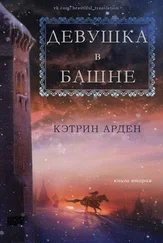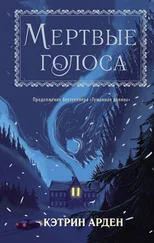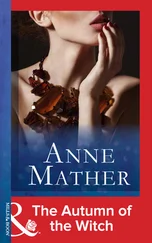She took his hands in hers. “Will it be thus for you,” she asked him, “so long as you live? To stand beside us, and to grieve for us?”
“I don’t know,” he said. “Perhaps. But—I think that I would rather feel pain than not feel anything at all. Perhaps I am grown mortal, after all.”
His tone was wry, but then his arm closed around her tightly, and she put her arms around his neck and pressed her face to his shoulder. He smelled of earth and blood and fear, of that day’s slaughter. But beneath, as always, were the scents of cold water and of pine.
She tilted her head up and pulled him down to her and kissed him fiercely, as though at last she could lose herself, forget duty and that day’s horror in the touch of his hands.
“Vasya,” he said, low, in her ear. “It is almost midnight. Where do you wish to go?” His hand was in the snarls of her hair.
“Somewhere with clean water,” she said. “I am sick to death of blood. And then? North. To tell Olya how…” She trailed off, had to steady her voice before she continued. “Perhaps—after—we may ride to the sea together, and see the light on the water.”
“Yes,” he said.
She almost smiled. “And then? Well, you have a realm in the winter forest, and I have mine, on the bow-curve of a lake. Perhaps we might forge one country in secret, a country of shadows, behind and beneath Dmitrii’s Russia. For there must always be a land for chyerti, for witches and for sorcerers, and for followers of the forest.”
“Yes,” he said again. “But for tonight, food and cool air, clean water and untainted earth. Come with me, Snegurochka. I know a house in a winter forest.”
“I know,” she said, and a thumb brushed away her tears.
She would have said she was too tired to vault to Solovey’s back, but her body did it despite her.
“What did we gain?” Vasya asked Morozko as they rode away. The snow had stopped, the sky shone clear. The season of frost had barely begun.
“A future,” returned the frost-demon. “For men will say in later years that this was the battle that made Rus’ a nation of one people. And chyerti will live on, unfaded.”
“Even for that, the price was very high,” she said.
They were riding knee to knee; he made no answer. The wild darkness of Midnight was all about them now. But somewhere ahead, a light shone through the trees.
ALMOST FROM THE EARLIEST DAYS of drafting The Bear and the Nightingale, I knew I wanted to end my trilogy at the Battle of Kulikovo. This battle always seemed to me to create a natural point of reconciliation for many of the conflicts I wished to consider on the pages of these three books: the Rus’ against the Tatars, Christian against pagan, Vasya trying to balance her own desires and ambitions with the needs of her family and her nation.
The path I charted to get to the battle has varied wildly since those early days. But the destination never changed.
The Battle of Kulikovo really happened. In 1380, on the Don river, Grand Prince Dmitrii Ivanovich acquired his historical moniker Donskoi, of the Don, by leading a combined force from several different Russian principalities against a host commanded by the Tatar temnik Mamai.
Dmitrii won. It was the first time the Russian people combined under the leadership of Moscow to defeat a foreign adversary. Some have argued that this event marks the spiritual birth of the nation of Russia. I have chosen to take it as such, although in reality, the historical significance of this battle is the subject of ongoing debate. Who, if not the novelist, has the right to cherry-pick historical interpretations that suit her best?
My fairy-tale version of this battle ignores the incredible amount of political and military maneuvering that led up to the event itself: the threats, the skirmishes, the deaths, the marriages, the delays.
But the great events of my version of Kulikovo are drawn from history:
A warrior-monk named Aleksandr Peresvet really fought in single combat with a Tatar warrior named Chelubey, and died victorious. Dmitrii really did trade places with one of his minor boyars, so that he could fight with his men, unmarked by the enemy. Oleg of Ryazan really did play an ambiguous role in the battle: perhaps he betrayed the Russians, perhaps he betrayed the Tatars, perhaps he merely strove to chart a path between the two.
All that is true.
And perhaps, beneath the battle recorded by history, there was fought another, between holy men and chyerti, over how they were to coexist in this land of theirs. Who knows? But the concept of dvoeveriye, dual faith, persisted in Russia up until the Revolution. Orthodoxy coexisted with paganism in peace. Who is to say that wasn’t the work of a girl with strange gifts and green eyes?
Who is to say, in the end, that the three guardians of Russia are not a witch, a frost-demon, and a chaos-spirit?
I find it fitting.
Thank you for reading all the way to the end. I started this series in a tent on a beach in Hawaii when I was twenty-three years old, and now you are holding the final piece of that work in your hands.
I am still astonished by the journey, and more grateful than I can say that it happened.
RUSSIAN CONVENTIONS OF NAMING AND address—while not as complicated as the consonant clusters would suggest—are so different from English forms that they merit explanation. Modern Russian names can be divided into three parts: the first name, the patronymic, and the last, or family, name. In medieval Rus’, people generally had only a first name, or (among the highborn) a first name and a patronymic.
FIRST NAMES AND NICKNAMES
RUSSIAN IS EXTREMELY RICH in diminutives. Any Russian first name can give rise to a large number of nicknames. The name Yekaterina, for example, can be shortened into Katerina, Katya, Katyusha, or Katenka, among other forms. These variations are often used interchangeably to refer to a single individual, according to the speaker’s degree of familiarity and the whims of the moment.
Aleksandr—Sasha
Dmitrii—Mitya
Vasilisa—Vasya, Vasochka
Rodion—Rodya
Yekaterina—Katya, Katyusha
PATRONYMIC
THE RUSSIAN PATRONYMIC IS always derived from the first name of an individual’s father. It varies according to gender. For example, Vasilisa’s father is named Pyotr. Her patronymic—derived from her father’s name—is Petrovna. Her brother Aleksei uses the masculine form: Petrovich.
To indicate respect in Russian, you do not use Mr. or Mrs., as in English. Rather, you address someone by first name and patronymic together. A stranger meeting Vasilisa for the first time would call her Vasilisa Petrovna. When Vasilisa is masquerading as a boy, she calls herself Vasilii Petrovich.
When a highborn woman married, in medieval Rus’, she would exchange her patronymic (if she had one) for a name derived from her husband’s name. Thus Olga, who was Olga Petrovna as a girl, has become Olga Vladimirova (whereas Olga and Vladimir’s daughter is called Marya Vladimirovna).
BABA YAGA—An old witch who appears in many Russian fairy tales. She rides around on a mortar, steering with a pestle and sweeping her tracks away with a broom of birch. She lives in a hut that spins round and round on chicken legs. In The Winternight Trilogy, she is Vasya’s great-grandmother.
BANNIK—“Bathhouse dweller,” the bathhouse guardian in Russian folklore.
BATYUSHKA—Literally, “little father,” used as a respectful mode of address for Orthodox ecclesiastics.
Читать дальше
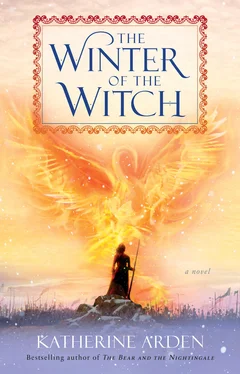

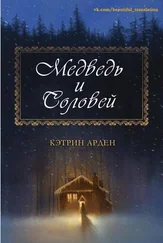

![Кэтрин Арден - Мертвые голоса [litres]](/books/389907/ketrin-arden-mertvye-golosa-litres-thumb.webp)

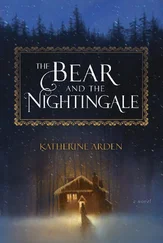
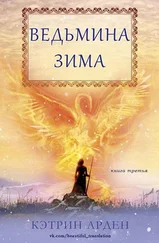
![Кэтрин Арден - Девушка в башне [litres]](/books/415518/ketrin-arden-devushka-v-bashne-litres-thumb.webp)
